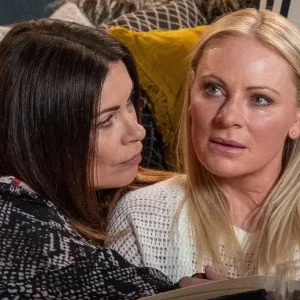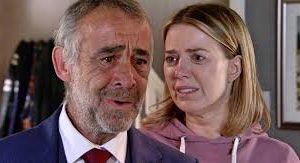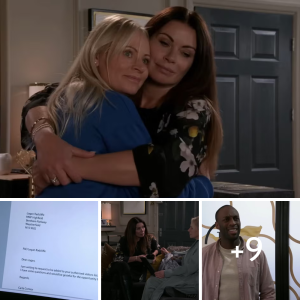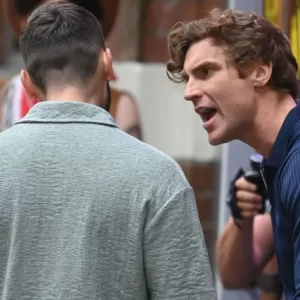A raw and devastating truth has just been unveiled, ripping through the glittering facade of celebrity and exposing a rarely seen, darker reality behind the scenes of British television. A beloved former star of “Coronation Street,” the iconic ITV soap, faced a crushing financial blow, having been tragically declared bankrupt with a staggering £90,000 debt just a few years after her departure from the familiar cobbles of Weatherfield. This poignant and shocking story serves not only as a stark warning but also as a profound insight into the immense financial hardships that can unexpectedly plague even those who graced our screens on one of the UK’s most cherished and enduring shows.
The actress at the heart of this compelling and unfortunate narrative is Eva Pope. For millions of viewers, she remains etched in memory as Tanya Pooley, a character she brilliantly portrayed in 143 episodes of “Coronation Street” between 1993 and 1994. During her time on the soap, Eva left an indelible mark, her performances contributing to the vibrant tapestry of Weatherfield life and securing her place in the show’s rich history. Her talent and on-screen presence resonated deeply with audiences, making her a recognizable and well-liked face across the nation.
Following her notable exit from “Coronation Street,” Eva Pope continued to diligently build a robust and diverse acting career. She demonstrated her versatility by appearing in a string of other highly popular British television dramas, including the long-running medical series “Casualty,” the rural police drama “Heartbeat,” the gritty police procedural “The Bill,” and the hospital drama “Holby City.” Each role showcased her acting prowess and commitment to her craft, allowing her to transition beyond her initial soap fame. However, for a significant segment of viewers, Eva Pope is perhaps most widely recognized for her prominent and critically acclaimed role as the no-nonsense head teacher Rachel Mason in the hit BBC drama “Waterloo Road.” Her portrayal in this series cemented her status as a respected and sought-after actress, seemingly at the peak of her career.
Yet, it was precisely in the very same year that she secured this significant and high-profile role on “Waterloo Road” that the shocking news of her bankruptcy came to light. This timing adds a layer of cruel irony to her story, highlighting how quickly fortunes can turn, even when professional success seems assured. Reports from The Mirror at the time detailed the precise nature of her financial woes: Eva was blindsided by a hefty £65,000 tax bill, an unexpected financial burden that would challenge even those with substantial savings. Compounding this, she had accumulated an additional £25,000 in credit card debts, pushing her total financial liability to an astonishing and insurmountable £90,000. This cumulative sum proved too much to bear, leading to the devastating declaration of bankruptcy.
A source close to the situation, speaking to The Mirror at the time, offered a poignant and stark insight into Eva’s predicament and the broader realities of the acting profession. “Eva’s a brilliant actress but failed to keep her finances in order,” the source stated. This observation, while perhaps an oversimplification, touches upon a critical issue for many self-employed creative professionals. The source went on to elaborate on the inherently precarious nature of an actor’s income, a reality often hidden from the public eye. “Being a jobbing actor or actress you often face long periods without a pay day. When the cheque does come in, the money is often accounted for before you know it. You can earn a lot in one month and then nothing for the next ten.”
This candid explanation paints a vivid and sobering picture of the feast-or-famine cycle that defines the lives of countless actors. Unlike salaried employees, actors working on contract basis rarely have a steady, predictable income. They must contend with periods of intense work and high pay, often followed by prolonged stretches of unemployment, during which they still incur living expenses, agent’s fees, and other professional costs (like headshots or travel for auditions). During these “dry spells,” many are forced to rely on credit cards or deplete savings, a strategy that can quickly spiral into insurmountable debt when the next “pay day” doesn’t arrive as hoped. The public perception of glamorous, wealthy actors often starkly contrasts with this often-precarious reality for the vast majority of working performers, highlighting a significant disconnect.
The impact of being declared bankrupt extends far beyond immediate financial loss. It carries profound legal and personal repercussions. A bankruptcy declaration severely damages one’s credit rating, making it incredibly difficult to secure loans, mortgages, or even certain jobs in the future. Assets may be seized, and the process itself is publicly recorded, adding a layer of personal shame and scrutiny, especially for someone in the public eye. The emotional toll of financial ruin – the stress, anxiety, and uncertainty about the future – can be immense, affecting mental health and personal relationships. For a public-facing career like acting, a bankruptcy declaration can also cast a long shadow, potentially impacting future casting opportunities, even if unfairly.
Eva Pope’s story, while specific to her, is far from unique. It serves as a microcosm of broader industry issues. In an era of increasing competition, shorter series runs, and the ever-evolving landscape of streaming services, financial stability for actors can be more elusive than ever. While some top-tier stars of shows like “Coronation Street” are now reported to be earning staggering annual salaries, as recently unveiled, Eva’s experience underscores the vast disparities in income and security within the very same industry. Her journey reminds us that the dream of stardom, while captivating, often conceals a much harsher, financially challenging reality for many who pursue it.
Ultimately, Eva Pope’s brave decision to openly address her financial struggles forces us to look beyond the glamour and acknowledge the human cost. It prompts critical questions about financial literacy within creative professions and the need for greater support systems within the entertainment industry to protect its talent from such devastating personal crises.
Were you surprised to learn about the financial difficulties actors, even familiar faces from TV, can encounter? And what do you think Eva Pope’s story reveals about career stability and financial pressures within the entertainment industry as a whole?





